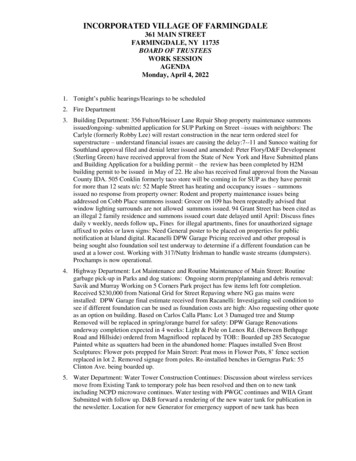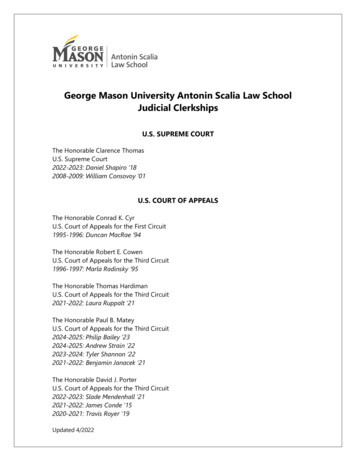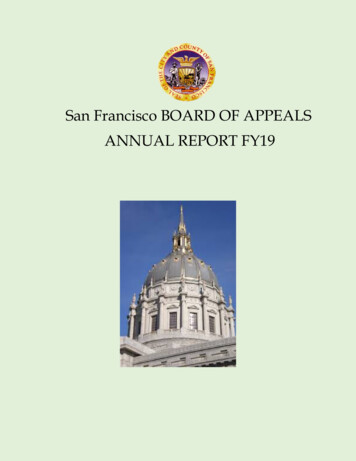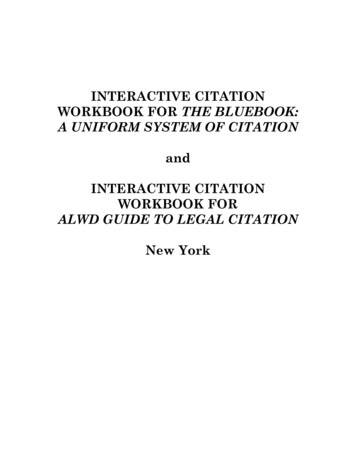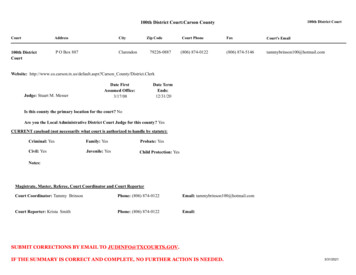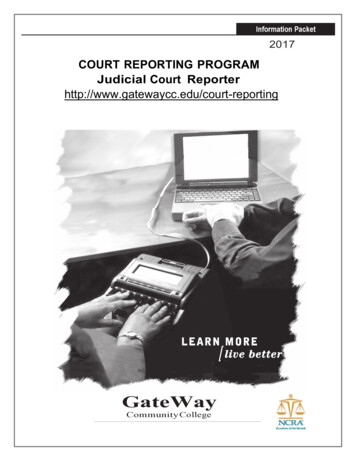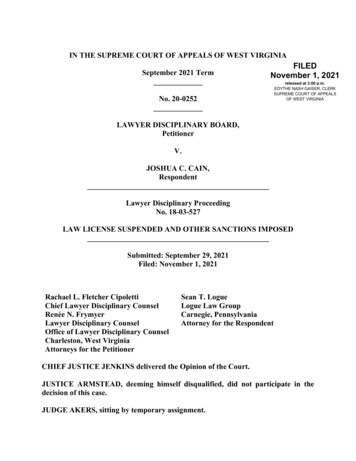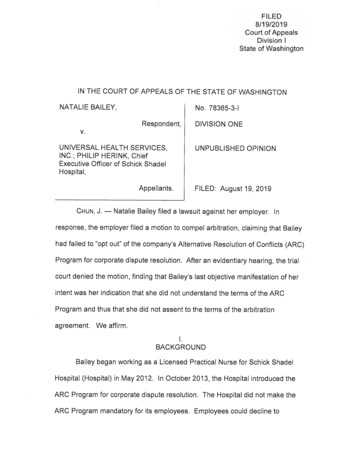
Transcription
IN THE COURT OF APPEALS OF THE STATE OF WASHINGTONNATALIE BAILEY,No. 78365-3-IRespondent,DIVISION ONEV.UNIVERSAL HEALTH SERVICES,INC.; PHILIP HERINK, ChiefExecutive Officer of Schick ShadelHospital,Appellants.CHUN, J.—UNPUBLISHED OPINIONFILED: August 19, 2019Natalie Bailey filed a lawsuit against her employer. Inresponse, the employer filed a motion to compel arbitration, claiming that Baileyhad failed to ‘opt out” of the company’s Alternative Resolution of Conflicts (ARC)Program for corporate dispute resolution. After an evidentiary hearing, the trialcourt denied the motion, finding that Bailey’s last objective manifestation of herintent was her indication that she did not understand the terms of the ARCProgram and thus that she did not assent to the terms of the arbitrationagreement. We affirm.BACKGROUNDBailey began working as a Licensed Practical Nurse for Schick ShadelHospital (Hospital) in May 2012. In October 2013, the Hospital introduced theARC Program for corporate dispute resolution. The Hospital did not make theARC Program mandatory for its employees. Employees could decline to
No. 78365-3-1/2participate by completing an ‘Opt Out Form.” For those employees who did notopt out, the ARC Program included binding arbitration.The Hospital educated employees and conducted trainings throughHealthStream, an online training and education management system. Eachemployee had a unique user name and password for HealthStream. When theHospital introduced the ARC Program, it required all employees to complete theARC Course through HealthStream.The ARC Course consisted of four steps. First, the employee opened andreviewed the ARC Summary, which provided a brief overview of the program.Next, the employee opened and reviewed the more detailed ARC Agreement,describing the application of the ARC Program, including the arbitration process.The ARC Agreement articulated the employee’s right to opt out of arbitration:Arbitration is not a mandatory condition of Employee’semployment at the Company, and therefore an Employee maysubmit a form stating that the Employee wishes to opt out andnot be subject to this Agreement. In order to Opt Out ofArbitration, the Employee must submit a signed and dated statementon a “Alternative Resolution for Conflicts Agreement Opt Out Form”(“Form”) that can be obtained from the Company’s local or corporateHuman Resources Department. In order to be effective, the signedand dated Form must be returned to the Human ResourcesDepartment within 30 days of the Employee’s receipt of thisAgreement. An Employee who timely opts out as provided in thisparagraph will not be subject to any adverse employment action asa consequence of that decision and may pursue available legalremedies without regard to this Agreement. Should an Employeenot opt out of this Agreement within 30 days of the Employee’sreceipt of this Agreement, continuing the Employee’semployment constitutes mutual acceptance of the terms of thisAgreement by Employee and the Company. An Employee hasthe right to consult with counsel of the Employee’s choice concerningthis.2
No. 78365-3-1/3For the third step of the ARC Course, employees opened and reviewedthe ARC Acknowledgement Form, which summarized the dispute resolutionprocedure. It included an acknowledgment of the receipt of the ARC Agreementand Opt Out Forms as well as an acknowledgement of the responsibility toreview the ARC agreement. The Acknowledgement reiterated that employeescould opt out of the ARC Program within 30 days:I understand that Arbitration is not a mandatory condition ofemployment. I understand that I may opt out of the ARC Program bysubmitting a completed Opt-Out Form in person, by fax, or mail tothe Human Resources Department within thirty days of the datebelow. I understand that if I opt out of the ARC Program, I will not besubject to any adverse employment action as a consequence of thatdecision and may pursue any available legal remedies.I FURTHER UNDERSTAND THAT IF I DO NOT OPT OUT OF THEARC PROGRAM WITHIN THIRTY DAYS OF TODAY’S DATE, IWILL BE BOUND BY THE ARC AGREEMENT.Finally, in the fourth step, the employee completed the ARC Attestation.The ARC Attestation required the employee to choose one of two options: (1) “Iacknowledge this course contains the ARC Program materials, and I have hadan opportunity to review them,” or (2) “I acknowledge this course contains theARC Program materials, but have difficulty understanding or accessing theinformation.” The second option includes the instruction, ‘Please go back andreview steps 1, 2, and 3. If you are still having difficulty accessing orunderstanding any information, please contact your Human ResourcesDepartment immediately as you only have 30 days to decide whether to optout of the ARC program.” An employee could not complete the ARCAttestation without completing the prior steps. Universal Health Services (UHS)3
No. 78365-3-1/4acknowledges that Bailey selected ARC Attestation option 2, indicating difficultyunderstanding the ARC Program information, and received the accompanyinginstruction to review or seek assistance immediately due to the 30-day window toopt out of the program.The ARC Course also included an opt out form, titled “OPTIONAL- OptOut Form.” Successful completion of the ARC Course did not require employeesto click on and review the opt out form. Highlighted language on the opt out formstated “USE ONLY IF YOU DO NOT WANT TO PARTICIPATE IN THE ARCPROGRAM.”According to HealthStream, Bailey completed the ARC Course andreceived a certificate of completion on October 24, 2013. Bailey’s HealthStreamtranscript shows that she spent 55 minutes on the ARC Course. In contrast, anaudit report of Bailey’s activities in HealthStream reflects that she finished theARC Course in approximately six minutes. According to Elaine Oksendahl,Director of Human Resources for Schick Shadel, Bailey never completed the optout form or contacted Human Resources for additional information about theARC Program. Bailey admits that she did not submit a signed ARC Agreementopt out form at any time.In October 2017, Bailey filed a lawsuit against UHS and Philip Herink(collectively, UHS), the chief executive officer of this hospital. She claimedinterference with her right to family leave and racial discrimination and retaliationunder the Washington Law Against Discrimination. After receiving notice of thelawsuit, UHS attempted to contact Bailey’s counsel to request arbitration under4
No. 78365-3-1/5the ARC Program. When Bailey did not respond to its request, UHS moved tostay the proceedings and compel arbitration.Bailey opposed the motion to compel. In a declaration, Bailey stated shewas unaware of the ARC Agreement until 201 5 when the nurses received apacket of information with the form included. According to Bailey, the informationwas confusing and neither the Director of Nursing nor Oksendahl in HumanResources provided assistance in understanding the documents. Bailey statedthat she voiced her concerns about the ARC Agreement to Human Resources tono avail.In response to Bailey’s declaration, UHS requested limited discovery andan evidentiary hearing to resolve the factual disputes about the ARC agreement.The trial court granted an evidentiary hearing with oral argument, and permittedlimited discovery relating to the validity of the arbitration agreement.Oksendahl and Bailey testified during the evidentiary hearing. Baileytestified that she learned about the ARC Program in 2015 when all the healthcareworkers received packages of documents, including the ARC opt out form.Bailey said they were asked to sign and backdate documents to 2013. Accordingto Bailey, she did not receive an opt out form so she went to Oksendahl torequest one. Oksendahl never provided her with a form and nobody couldexplain the program to her. Bailey also stated that she told other nurses,Oksendahl, and the Director of Nursing that she did not want to participate in theARC Program.5
No. 78365-3-116Oksendahl testified that Bailey competed the ARC Course on October 24,2013. Bailey had access to the opt out form online but failed to submit a signedform. Oksendahl further stated that Bailey never informed her of an intention toopt out of the ARC Program.Upon conclusion of the evidentiary hearing, the trial court denied UHS’smotion to compel arbitration. The court determined Bailey did not assent to theARC Agreement and the parties never formed a contract, because ‘the lastundisputed objective manifestation by Plaintiff was that she did not understandthe arbitration material.” UHS appeals.DISCUSSIONUHS argues that Bailey’s failure to opt out amounts to an objectivemanifestation of her acceptance of the ARC Agreement, despite evidence thatshe failed to understand the program materials. Bailey claims she neverassented to the terms of the ARC Agreement as required for a valid contract.We agree with Bailey.The Federal Arbitration Act1 (FAA) provides that written arbitrationagreements are valid, irrevocable, and enforceable except upon grounds thatexist at law or in equity for revocation of a contract. 9 U.S.C.§ 2;RCW 7.04A.060(1). The United States Supreme Court has established a liberalpolicy favoring arbitration agreements. Zuverv. Airtouch Commc’n Inc., 153Wn.2d 293, 301, 103 P.3d 753 (2004). Therefore, “[c]ourts must indulge every1 The FAA applies to all employment contracts except those of certain transportationworkers. Zuverv. Airtouch Commc’n Inc., 153 Wn.2d 293, 301, 103 P.3d 753 (2004). Therefore,the FAA governs enforcement of the Hospital’s ARC Agreement. The parties agree.6
No. 78365-3-1/7presumption ‘in favor of arbitration, whether the problem at hand is theconstruction of the contract language itself or an allegation of waiver, delay, or alike defense to arbitrability.” Zuver, 153 Wn.2d at 301 (quoting Moses H. ConeMem’l Hosp. v. Mercury Constr. Corp., 460 U.S. 1,24, 103 S. Ct. 927,74 L. Ed.2d 765 (1983)). However, generally applicable contract defenses may invalidatean arbitration agreement without contravening the FAA. Zuver, 153 Wn.2d at302.Appellate courts review de novo a trial court’s decision on a motion tocompel arbitration and the party opposing arbitration bears the burden of provingthat the agreement is not enforceable. Zuver, 153 Wn.2d at 302. But thestandard of review differs where, as here, the trial court reached its decision afterconducting an evidentiary hearing. In such cases, “{ujnderlying factual findingsare reviewed for clear error,2 while ‘[t]he interpretation and meaning of contractprovisions’ are reviewed de novo.” Nguyen v. Barnes & Noble Inc., 763 F.3d1171, 1175 (9th Cir. 2014) (quoting Milenbach v. Comm’r, 318 F.3d 924, 930 (9thCir. 2003) (internal citation omitted)). Where the trial court has weighed theevidence, the reviewing court’s role is limited to determining whether substantialevidence supports the findings of fact, and whether those findings in turn supportthe trial court’s conclusions of law. Ford Motor Co. v. City of Seattle, Exec.Servs. Dep’t., 160 Wn.2d 32, 56, 156 P.3d 185 (2007). “Substantial evidence to2 Federal clear error review mirrors Washington’s substantial evidence review. NoW v.Special Elec. Co., No. 77888-9, slip op. at 3 (Wash Ct. App. Jul. 1, 2019) (as amended Jul. 889%20order%2oamending%2oand%2oopinion.pdf.-7
No. 78365-3-1/8support a finding of fact exists where there is sufficient evidence in the record ‘topersuade a rational, fair-minded person of the truth of the finding.” Hegwine v.Lonciview Fibre Co., 162 Wn.2d 340, 353, 172 P.3d 688 (2007) (quoting In reEstate of Jones, 152 Wn.2d 1, 8, 93 P.3d 147 (2004)).“The duty to arbitrate arises from a contractual relationship.” Olson v.Bon, Inc., 144 Wn. App. 627, 633, 183 P.3d 359 (2008). A valid contract requiresmutual assent or a “meeting of the minds” on the essential terms. SaluteenMascherskyv. Countrywide Funding Corp., 105 Wn.App. 846,851,22 P.3d 804(2001). Washington follows the objective manifestation theory of contracts where“we attempt to determine the parties’ intent by focusing on the objectivemanifestations of the agreement, rather than the unexpressed subjective intent ofthe parties.” Hearst Commc’n, Inc. v. Seattle Time Co., 154 Wn.2d 493, 503,115 P.3d 262 (2005). Therefore, “mutual assent of the parties must be gleanedfrom their outward manifestations.” Saluteen-Maschersky, 105 Wn. App. at 854.Generally, the existence of mutual assent or a meeting of the minds is aquestion of fact. Sea-Van Investment Assocs. v. Hamilton, 125 Wn.2d 120, 126,881 P.2d 1035 (1994). The party asserting the existence of the contract has theburden of proof, including the existence of mutual intention. SaluteenMaschersky, 105 Wn. App. at 851. Therefore, UHS must establish that Baileyentered into a valid contract for arbitration before the burden shifts to her to provethe agreement is not enforceable.The trial court determined that the “last undisputed objective manifestationby the Plaintiff was that she did not understand the arbitration material.” As a8
No. 78365-3-1/9result, “Plaintiff never assented to the contract, the thirty-day opt-out period nevercommenced, and no agreement to arbitrate was formed.” This amounts to afinding of fact that Bailey and UHS failed to arrive at a meeting of the minds onthe ARC Agreement. UHS does not assign error to this finding of fact, resultingin a verity on appeal. See Robel v. Roundup Corp., 148 Wn.2d 35, 43, 59 P.3d611(2002). Without mutual assent, the trial court correctly concluded the partiesfailed to enter a valid contract. As a result, Bailey does not have a contractualduty to arbitrate, and the trial court properly denied UHS’s motion to compel.Additionally, substantial evidence in the record supports the trial court’sfinding that Bailey did not assent to the terms of the ARC Agreement. The recorddemonstrates that Bailey completed the ARC Course as required. Sheacknowledged receipt of the ARC Agreement, which allowed her to opt out within30 days. However, Bailey’s selection of option 2 on the ARC Attestation, “Iacknowledge this course contains the ARC Program materials, but have difficultyunderstanding or accessing the information,” belies an intent to be bound by theterms of the ARC Agreement. In assessing the parties’ objective manifestation ofintent, this expressed difficulty in understanding the Agreement or accessingpertinent information suggests a failure to achieve mutual assent on the terms.Therefore, UHS fails to satisfy the burden of proving the existence of a contract.In light of the foregoing, we agree with the trial court that Bailey did notmanifest her assent to the ARC agreement and the parties never formed acontract to arbitrate. Without a valid contract, Bailey does not have a duty to9
No. 78365-3-1/10arbitrate. Therefore, we affirm the trial court’s denial of the motion to compelarbitration.Affirmed.CL 4WE CONCUR:A‘qi1’ I10
Executive Officer of Schick Shadel Hospital, Appellants. FILED: August 19, 2019 CHUN, J. — Natalie Bailey filed a lawsuit against her employer. In response, the employer filed a motion to compel arbitration, claiming that Bailey had failed to 'opt out" of the company's Alternative Resolution of Conflicts (ARC)



